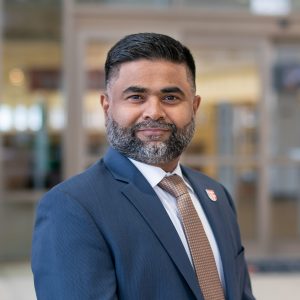
Starting in fall 2024, University of Texas Permian Basin will offer a master of social work degree with an eye toward filling a vast need for people in the social work field.
This falls under the behavioral health fields with scholarships being offered by the Permian Strategic Partnership and Scharbauer Foundation.
Provost/Senior Vice President of Academic Affairs Raj Dakshinamurthy said they received approval from the UT System and the Higher Education Coordinating Board.
“Step two is to get the accreditation from the university accrediting body, SACSCOC (Southern Association of Colleges and Schools Commission on Colleges),” Dakshinamurthy said.
“We initiated the process last fall and we received approval, maybe I would say a month ago,” he said in an April 11 interview. “Now we are trying to complete the program specific accreditation with CSWE, Council for Social Work Education. That will give us the pre-licensure for our students. That will include multiple layers. They have an open deadline and we are trying to meet that deadline either in June or December,” he added.
CSWE will give a conditional accreditation status for a year while UTPB goes through the process, Dakshinamurthy said.
He added that they are using faculty members and an outside consultant to help them with the paperwork. Dakshinamurthy said they are hoping to meet the summer timeline.
“We will see; fingers crossed and we are excited,” he added.
UTPB will be offering online options for students so students from all different demographics and background from a 150-200-mile radius can take classes.
Dakshinamurthy noted that the average age of UTPB’s graduate students is 30-plus and many of them work full time.
He added that they are going to offer a flexible program to accommodate the students’ pace. Plus they will get scholarship funds.
“So it’s a win-win for them,” Dakshinamurthy said.
He added that “good, quality faculty” have been hired and both have significant social work experience in the field and in teaching.
“We feel that we are in a good place to have this program launched this fall,” Dakshinamurthy said.
He said the advantage of having a master’s degree is that it leads to the students applying for licensure to become licensed social workers.
“They can also pursue teaching. They can pursue many other carers using a graduate degree. I served as a graduate dean at UTPB for four years and another institution for several years. I always sell this like this: Learn more, earn more,” Dakshinamurthy added.
The Council for Graduate Schools, a national academy committee, did research and found that you can earn $1 million more over 27 years if you earn a master’s degree compared to a bachelor’s degree.
He noted that he has never seen a university that offers a graduate scholarship that pays for full tuition and fees. Graduate programs usually offer graduate assistantships.
“We have this phenomenal opportunity for our students to go to school, 60 credit hours, which means it’s a three-year program and we have (a) scholarship available for them to get a master’s degree for free; completely free,” Dakshinamurthy said.
He added that he tried googling master’s programs many times and was unable to find one that offered a similar scholarship opportunity. Universities may offer packages, but not a complete, free graduate education.
He noted that it’s not just tuition and fees, but they are building a bank of clinical sites so students can gain the clinical hours to apply for licensure.
“It’s a complete package for someone who wants to pursue a graduate degree. I would say it’s a blessing for us to have this $10 million from PSP and Scharbauer. I’ve never seen anything like this. I’ve never experienced anything like this. It’s such a significant gift for us and we really want to thank PSP and Scharbauer and I believe our goal is to make sure we deliver enough workforce in the psychologist, social work, counselor (sector) to meet our regional needs and beyond that,” Dakshinamurthy said.
He added that social workers and behavioral health professionals are a need state and nationwide.
“I talk to my colleagues across the state and we are hiring. Everyone is hiring people. … We still need a lot of workforce around health sciences, particularly behavioral health. And everyone is seeing it,” even at research institutions, Dakshinamurthy said.



